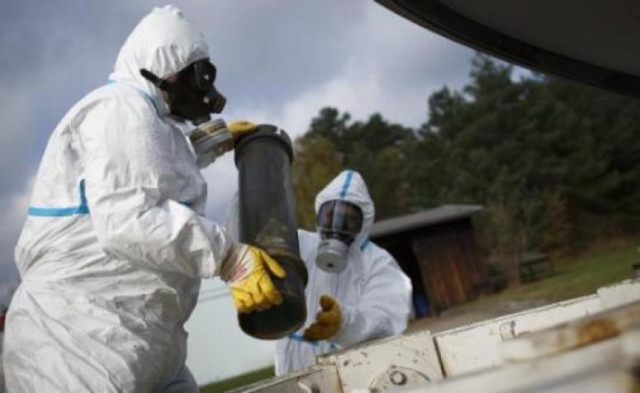Last of Syria's declared chemicals removed for destruction: OPCW
Syrian foreign ministry confirms that "final cargo of chemical agents has today been taken outside Syria."

Last of Syria's declared chemicals removed for destruction: OPCW
"As we speak, the ship (carrying the last chemicals) has just left the port (of Latakia)," Ahmet Uzumcu, head of the Organisation for the Prohibition of Chemical Weapons, told journalists in The Hague where the OPCW is based.
"Removing the stockpile of precursor and other chemicals has been a fundamental condition in the programme to eliminate Syria's chemical weapons," Uzumcu said.
The Dutch head of the joint OPCW-UN mission, Sigrid Kaag, hailed the end of "the most operationally challenging task" in the international efforts to destroy Damascus' chemical arsenal.
Syria had previously shipped out 92 per cent of its stockpile of chemical weapons under the terms of a UN-backed and US-Russia brokered agreement to head off Western air strikes against the regime last year.
But Damascus delayed shipping the remaining eight per cent of the stockpile from another site, citing security concerns over transporting it to the port of Latakia.
"While a major chapter in our endeavours closes today, OPCW's work in Syria will continue," Uzumcu said.
"We hope to conclude soon the clarification of certain aspects of the Syrian declaration and commence the destruction of certain structures that were used as chemical-weapons production facilities."
The Syrian foreign ministry confirmed in a statement that "the final cargo of chemical agents has today been taken outside Syrian territory".
The ministry hailed the success of the mission and called on the international community to pressure Damascus's arch-foe Israel to sign up to international agreements on weapons of mass destruction.
Kaag said technical experts from secretariat of The Hague, the joint mission and the Syrian authorities would continue to investigate "the completeness of Syria's initial declaration to the OPCW".
"Any state party when they accede to the chemical weapons convention... we look at anomalies, we look at discrepancies in cooperation," Kaag told AFP.
"The most important thing is that the materials are out. They will be destroyed safely and securely... out of harm's way, and they can also no longer fall in the wrong hands."
Syria was supposed to hand over its chemical arsenal so the international community could destroy it by the end of June, but it has been widely acknowledged it would pass that deadline.
"While the June 30 deadline, as already was stated a few weeks ago, will not be met... the materials are out of country and the bulk of Syria's declared chemical weapons programme is no more," said Kaag.
The deal was reached after the US threatened to carry out airstrikes against President Bashar al-Assad's regime after a sarin nerve gas attack in a rebel-held suburb in Damascus killed around 1,400 people.
A Danish ship will now take the chemicals to Italy's port of Gioia Tauro where they will be transferred to the US ship Cape Ray for destruction at sea. Some are also due to be destroyed in the US, Britain and Finland.
OPCW spokesperson Michael Luhan told AFP that the Danish vessel would arrive in Italy "within a week". Uzumcu confirmed that once they have been transferred to the US vessel it could take up to 60 days to destroy them.
"Within the next four months most chemicals will be destroyed," he said, adding that Damascus' cooperation has been "commensurate with the requirements" of the deal.
His words contrast with news from week an OPCW investigation team, which last week said chemical agents such as chlorine, which Syria was not obliged to hand over, have recently been used "in a systematic manner in a number of attacks".
Assad's regime and rebels have both accused the other of using chemical agents in the bloody uprising that began in March 2011.
The OPCW team was attacked on May 27 while probing an alleged chlorine attack, but managed to obtain evidence the chemical had been used as a weapon.
France and the US have also alleged that Assad's forces may have unleashed industrial chemicals on several rebel-held villages in recent months.
Syria did not have to declare its stockpile of chlorine -- a weak toxic agent that can be turned into a weapon -- under the disarmament deal as it is widely used for commercial and domestic purposes.
Key dates since Syria's 2013 chemical attack
A timeline of the main developments since chemical weapons attacks near Damascus on August 21, 2013:
2013
August 21: Syrian troops launch an offensive in the Damascus suburbs. The opposition accuses the army of chemical weapons strikes east and southwest of the capital, including in Moadamiyet al-Sham where hundreds are killed. The government denies responsibility and blames rebels.
August 23-26: The United States mulls possible military strikes. Britain and France say the government was behind the attack. Damascus ally Russia warns against military intervention without UN Security Council approval.
August 30: A US intelligence report blames the Syrian regime for the Moadamiyet al-Sham attack and says 426 children were among 1,429 people killed.
September 14: Washington and Moscow agree on a plan to eliminate Syria's chemical weapons by the middle of 2014, putting off the threat of punitive strikes against the Assad regime by Washington and Paris.
September 16: A UN reports says there is clear evidence that sarin gas was used on August 21.
September 27: The Security Council unanimously passes a landmark resolution ordering the destruction of Syria's chemical arsenal.
October 6: A disarmament team, from the UN and the Organisation for the Prohibition of Chemical Weapons (OPCW) starts work on destroying the weapons and production facilities in Syria.
October 14: The Chemical Weapons Convention comes into force for Syria.
October 31: The OPCW says all of Syria's declared chemical arms production equipment has been destroyed ahead of a deadline and that its entire declared stock of more than 1,000 tonnes of chemical weapons and agents are under tamper-proof seal.
November 7: Inspectors have verified all but one of Syria's 23 declared chemical weapons sites, the OPCW says.
2014
May 8: Syria still has chemicals to make enough nerve agent to replicate last August's deadly attack outside Damascus, Britain warns.
May 13: The Syrian regime is believed to have used chemical weapons including chlorine in 14 attacks since late 2013, French Foreign Minister Laurent Fabius says.
May 15: US Secretary of State John Kerry says he has seen "raw data" that suggests that chlorine has been used in the Syrian conflict.
May 21: Syria's stocks of a key chemical used to produce sarin have been destroyed, the OPCW-UN joint mission says.
May 27: A team from the OPCW investigating an alleged chlorine attack against rebel-held Kafr Zita manages to visit the town, hours after coming under attack.
June 18: An initial report by the OPCW team says chemical weapons such as chlorine have been used in a "systematic manner" in Syria.
June 23: The watchdog says the last of Syria's declared chemical agents have been shipped from the country after months of delays and are en route for destruction at sea.



















COMMENTS
Comments are moderated and generally will be posted if they are on-topic and not abusive.
For more information, please see our Comments FAQ